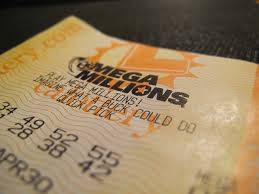Of the four options given, I would say that the sentence "the lottery winner gets stoned" is an example of irony.

A foil is more likely to be a character or a setting than a particular word. Foils are used to show another character, often the hero, into sharper relief, so we may see their qualities more clearly by contrast with another character, often a villain or a sidekick.
The setting of a story is where it takes place, the geographical background of the narrative. The setting can almost be a character in itself or crucial to the progress of the story, such as the bleak Yorkshire moors of Emily Bronte's Wuthering Heights (1847). We don't learn anything about setting in the sentence you provided.
The Oxford Dictionary of Literary Terms describes irony as "a subtly humorous perception of inconsistency in which a straightforward statement is undermined by its context." In your example, we might not expect a lottery winner to get stoned, as either its the sort of thing that person would do anyway, and is behaving regardless of a special event (when we might expect them to celebrate with champagne for example).
It is also ironic in the sense that getting stoned is more often associated with people who aren't well off, rather than as a rich person's activity.
That said, I don't think "the lottery winner gets stoned" is the best example of using irony. One of my favorites is the only thing ironic about Alanis Morissette's song 'Ironic' is that none of the examples she uses is ironic!